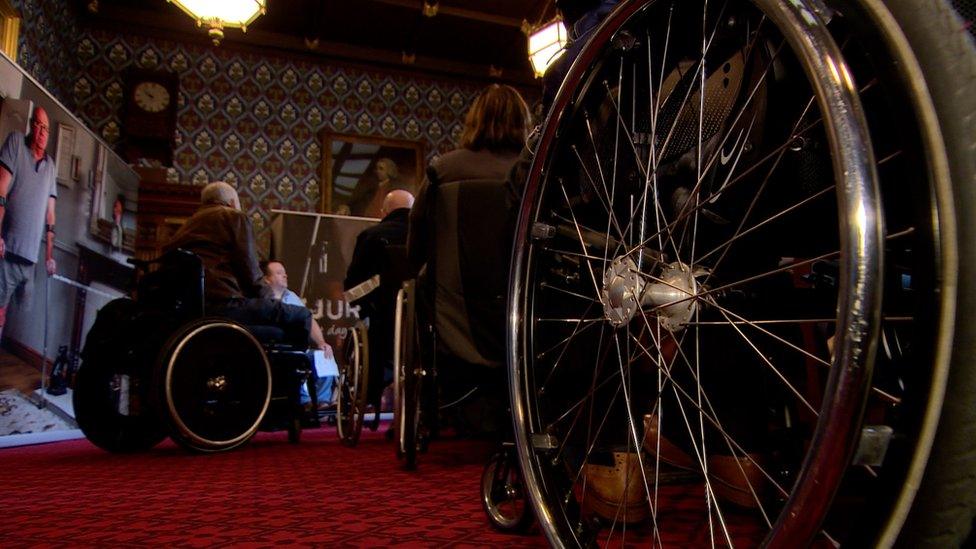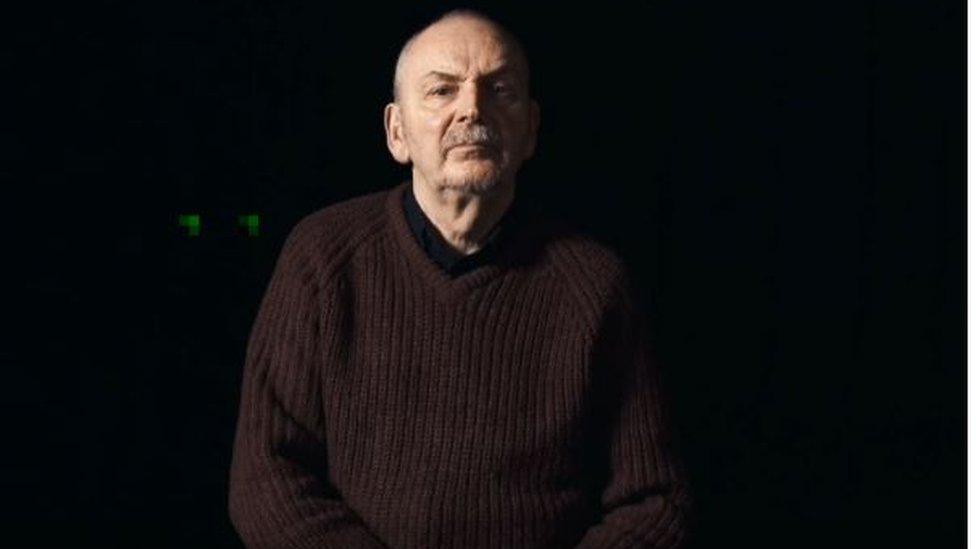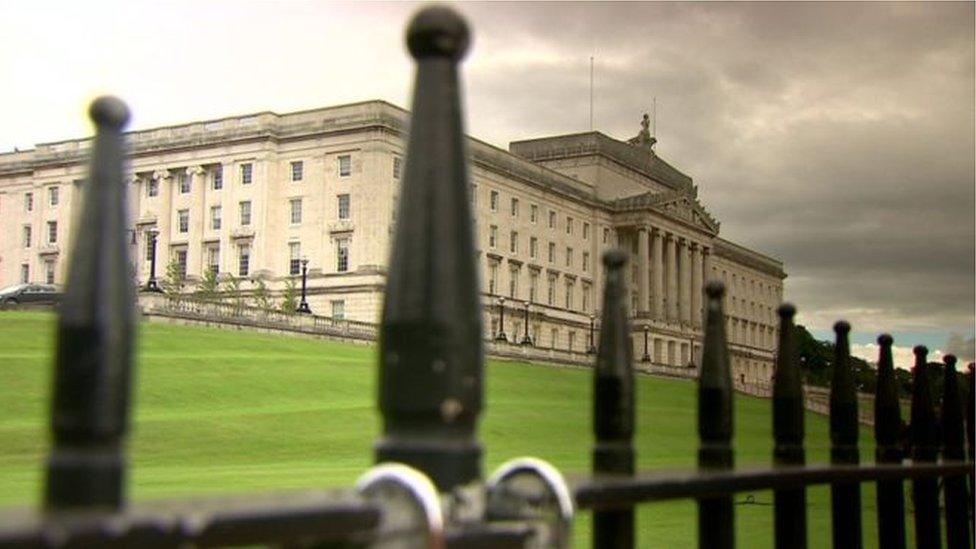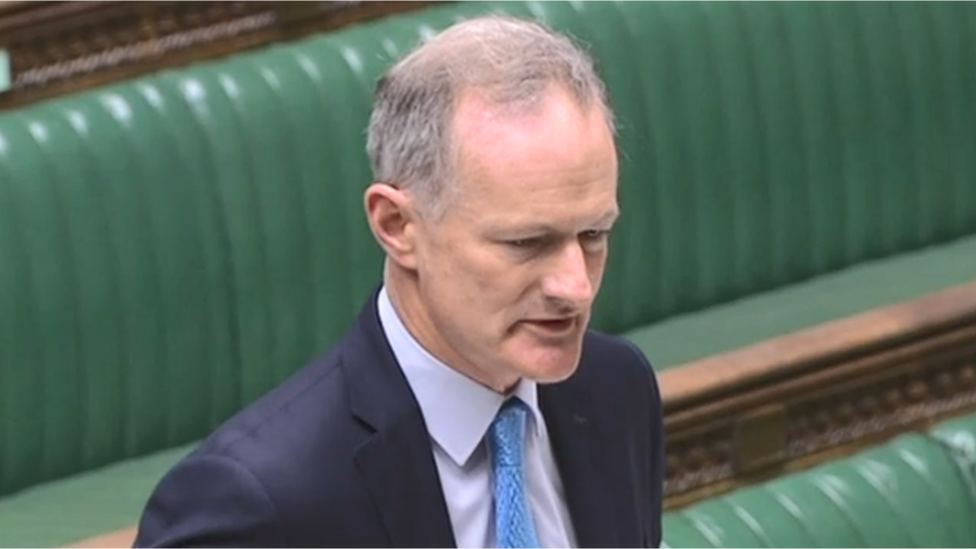Troubles pension to be set at almost £10k for some victims
- Published

Several people have been paralysed or lost limbs in bombings and gun attacks
The most-severely disabled victims of the Troubles could receive a special pension of almost £10,000 a year.
The Northern Ireland Office (NIO) has published a consultation, external with proposed payment levels for victims injured "through no fault of their own".
Smaller pensions are proposed for victims with less severe disabilities.
It follows an intervention from MPs who voted to legislate for abortion, same-sex marriage and a Troubles pension if there was no devolution by 21 October.
Westminster set MLAs a deadline to agree a devolution deal in July, at which point Stormont had been suspended for more than two and half years.
At midnight on Monday, the 21 October deadline passed without any sign of agreement between Northern Ireland parties to restore Stormont's power-sharing government.
Therefore, the NIO is now compelled to act on MPs' amendments passed as part of the Northern Ireland (Executive Formation etc) Act 2019.
It means regulations to enable the pension payments to be made must be finalised by the end of January 2020.
The scheme will open for applications at the end of May.

"I am quietly confident, but until it is up and running there will always be worry about it."
Peter Heathwood, 66, from County Down, is among injured victims of the Troubles who have campaigned for a pension since 2009.
The former history teacher was paralysed when he was shot by loyalists in his home on 27 September 1979. His father died from a heart attack at the scene of the shooting, which was a case of mistaken identity.
He welcomed the law change but said he was "worried about some of the small print" in the consultation document, which suggested "there might be a bit more to go".

Troubles pension campaigner Peter Heathwood believes "there might be a bit more to go"
"It mentions that if you have had injury compensation that this may affect payment in some way. Will the government backtrack for those with criminal injuries claims?" asked Mr Heathwood.
"This is not about going on luxury holidays, it's about getting the grass cut, it's about getting painting jobs done and getting slates put back on the roof after a storm.
"It's about paying for those things that give you a bit of comfort and dignity going into old age."

'40,000 injured'
The pension for Troubles victims was controversial due to concerns that injured paramilitaries would be eligible for payments.
However, in July NIO Minister John Penrose ruled that out in the House of Commons.
He said there was "no moral equivalence between a bystander badly injured in a terrorist explosion through no fault of their own and and people who manufactured the bomb, placed the bomb, and detonated the bomb".
An estimated 40,000 people were injured during the Troubles, according to Secretary of State Julian Smith, who wrote the foreword for the NIO consultation.
"Those living with the consequences of serious injury do so with a constant reminder of those dark days in our history," he wrote.
"Many of their injuries are physical but a significant number of survivors also continue to suffer from deep psychological trauma."
'Lump sum option'
The proposed payment levels are based on the Industrial Injuries Disablement Benefit and War Pension Scheme.
They range from an annual pension of £1,974 for those whose level of disability has been assessed as 20% (such as the loss of fingers or toes) through to £9,870 for those who suffer the highest level of disability, such as blindness, deafness or the loss of more than one limb.
Allow X content?
This article contains content provided by X. We ask for your permission before anything is loaded, as they may be using cookies and other technologies. You may want to read X’s cookie policy, external and privacy policy, external before accepting. To view this content choose ‘accept and continue’.
The consultation proposes that the payments be backdated five years to the Stormont House Agreement of December 2014, when political agreement was first reached on the principle of establishing a victims' pension scheme.
"It seems right that payments should reflect the time that has passed since this scheme should have been established," the paper states.
It also proposes that victims aged 60 or over should be given the choice to receive annual payments or apply for a lump sum award equivalent to 10 years of payments.
This option has been suggested so that "individuals at a later stage in life have greater flexibility to use the award as they judge best".
The document makes clear that "consistent with the government's commitment that it will not be open to those injured through fault of their own: individuals who were injured as a result of their involvement in the orchestration of the relevant incident, as evidenced by a relevant criminal conviction, will not be eligible for payments".
It also pays tribute to one victims' organisation in particular - the WAVE injured group - saying it is to be "commended for having fought bravely, tirelessly and passionately for a scheme of regular payments to be made to the injured".
Allow X content?
This article contains content provided by X. We ask for your permission before anything is loaded, as they may be using cookies and other technologies. You may want to read X’s cookie policy, external and privacy policy, external before accepting. To view this content choose ‘accept and continue’.
The consultation will be open for responses until 26 November 2019.
The NIO said this was "shorter than our standard period of consultation" because the Westminster legislation requires that pension regulations are in place by 31 January 2020.
- Published8 October 2019

- Published22 July 2019
